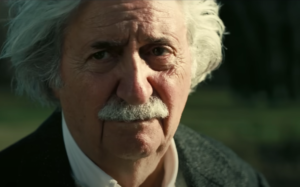Oppenheimer (2023) review
Dir. Christopher Nolan
By: Steve Pulaski
Rating: ★★★★
Steven Spielberg’s West Side Story in 2021 was such a remarkable picture that you would’ve been led to believe the then-74-year-old filmmaker had been making musicals his entire career. On the contrary: that film was a first for the veteran. Similarly, watching Christopher Nolan’s Oppenheimer, you might need to remind yourself that this is the cinematic tactician’s first ever biopic. Yet, it’s perfectly fitting that the acclaimed director’s first biographical outing intensely focuses on a self-destructive man obsessed with solving a seemingly impossible math problem in order to create chaos and potentially put the world on the brink of disaster.
I haven’t won over any cinephiles nor devout Letterboxd users with my assessments of Nolan’s previous two films. I found Dunkirk to be a rousing spectacle in theaters, but felt its character-work lacking to the point where the film itself would play like just another war movie on TV (upon rewatch, I was correct). I too loathed Tenet under the basis that any movie that basically lets me know within 15 minutes I’ll have to scour the internet in hopes of making basic sense of the plot outright ruins the experience for me.

One of many fascinating attributes about Nolan’s latest, and one of his all-time best, is it’s less concerned with plot in both linear and nonlinear forms. The story’s structure, if anything, usurps the plot. Nolan and editor Jennifer Lame employ a tactic that gives us morsels of Admiral Lewis Strauss (an outstanding Robert Downey, Jr.) trying to get approved for a spot in President Eisenhower’s cabinet as well as scenes of J. Robert Oppenheimer (Cillian Murphy) seeking a security certificate renewal appeal in a makeshift court-like setting. These are interspliced with the present storyline until that thread catches up with the timeline of the hearings and appeal in the third act, not long after the atom bomb is tested and subsequently dropped on Hiroshima and Nagasaki. Metaphorically, it’s like seeing an aerial view of two overhead roads merge into one in zipperlike fashion. It’s impressively fluid and you’re almost left dumbfounded by its seamlessness.
In telling the story of the man who earned the nickname “The American Prometheus” — also the title of Kai Bird and Martin J. Sherman’s biography on the titular physicist, which is credited as the source material for the film — Nolan makes this film one of his talkiest yet. Nolan’s camera favors intense closeups of his characters, and the result is surprisingly gripping. Predictably, no singular character gets as many closeups as Murphy’s Oppenheimer. He’s a man who exudes an attractive coolness while concealing the atom bomb that is close to detonating in his head. He’s a brilliant mathematician, but he’s also wildly impulsive. Murphy is incredible, turning in a tour-de-force performance of a complicated man. Like a true craftsman on-camera, he commands many-a-scene without ever raising his voice. Where some filmmakers might’ve pivoted to him shouting in defense of his actions, Nolan sometimes seats Murphy in the background with his body language doing the talking. This is one of the director’s best actor-filmmaker collaborations of all-time.
Over the course of three hours, we penetrate Oppenheimer’s private life and see how he burned bridges, had numerous affairs, neglected his wife and kids, and left the world with a weapon that could ultimately destroy it.

After completing his Ph.D. in physics in Germany, Oppenheimer returns to the States to teach at Berkeley, where he buddies up to young communists like Jean Tatlock (Florence Pugh), with whom he has an affair behind his wife, Kitty’s (Emily Blunt), back. Enter Leslie Groves (Matt Damon), an Army man who would go on to act as Oppenheimer’s military handler in the development of the atom bomb. Oppenheimer’s team of young, aspirational scientists work around the clock to develop this massive weapon that would go on to be first trialed in the Trinity test before then being used by President Harry S. Truman on the Japanese as a weapon of catastrophic genocide in the middle of World War II.
Back to those wonderful, intimate closeups. Occasionally, especially in the first half of the film, they’re interrupted by sequences of flames rising, debris flying, or other various explosions. Editor Lame employs sort of a triple-timed rhythm to these cutaways where we see a brief glimpse of something, then that same something again for a few more seconds, and then during the third cutaway, we get some tangible context. It’s initially abstract, as these events are often employed as metaphors for personal turmoil or other looming disasters. However, it also elevates Oppenheimer to that rare category of biographical epics that functions bravely and successfully as a mood movie of sorts.

Lame’s editing really solidifies itself as an integral player as Oppenheimer rolls on. The expansive runtime allows for significant events to be reframed and reevaluated, particularly those courtroom cutaways, therein altering or changing our perception of characters in the process. The scenes that will render the most acclaim, I presume, are the ones where Oppenheimer himself is on the verge of a mental breakdown. In two separate sequences — one when he’s the recipient of massive praise following the Hiroshima bombing, and another when he’s being grilled in a kangaroo court — the screen (acting as his POV) starts to turn white, like after a bomb blast. He starts to see the flesh peeling off the faces of the individuals in the room.
Ludwig Göransson’s score is almost constantly chiming in throughout the course of the movie, but it especially heightens in these moments as it drowns out the ongoing dialog. Not since Justin Horwitz’s massively underrated compositions in Babylon has a score been so integral to a film’s success. Göransson knows when to compliment a sequence with light, almost background strings as well as bury them with intensity, suspense, and peril.

I assume there will be some disappointed, perhaps even offended, that Nolan doesn’t reckon the atrocities that happened in Hiroshima. Nolan presents Oppenheimer’s guilt over the matter in contrast to Strauss’ own convictions that the war would’ve persisted and more American soldiers would’ve been lost had the bombs not been dropped. It also allows for Oppenheimer’s beliefs that the Japanese would’ve had no choice but to surrender without the use of atom bombs to breathe. Rekindling that debate is one that should be reserved for another movie. Nolan sticks to dramatizing the life of the titular individual and the significant figures around him over the course of several decades. He introduces artistic metaphors like a great novelist, armed with audacious visuals and an army of masterful aestheticians. He’s also intelligent enough to let you continue the debate and the points raised in the film on your own time.
Unlike some other lengthy films released this year, Oppenheimer makes great use of its 180-minute runtime. The manner in which it ignites your senses, raises tension, incites fear, especially during the Trinity test sequence (as harrowing as any this year, particularly in a theater), and engages you on an intellectual level with its many swirling dynamics and intertwining relationships is artful and compelling. I know I’ve seen a great epic when, after three long hours, packed with a ton of dialog, information, and events, all I can do is sit in silence as the credits roll.
NOTE: Oppenheimer is now playing exclusively in theaters.
My review of Dunkirk (2017)
My review of Tenet (2020)
Starring: Cillian Murphy, Emily Blunt, Matt Damon, Robert Downey Jr., Florence Pugh, Josh Hartnett, Casey Affleck, Rami Malek, Kenneth Branagh, and Josh Peck. Directed by: Christopher Nolan.
About Steve Pulaski
Steve Pulaski has been reviewing movies since 2009 for a barrage of different outlets. He graduated North Central College in 2018 and currently works as an on-air radio personality. He also hosts a weekly movie podcast called "Sleepless with Steve," dedicated to film and the film industry, on his YouTube channel. In addition to writing, he's a die-hard Chicago Bears fan and has two cats, appropriately named Siskel and Ebert!



Well done, Steve!